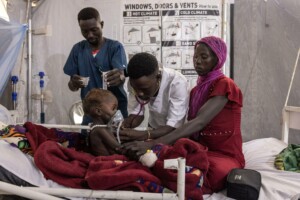OCHA Sudan bulletin 8: Over 90,000 people have fled Jebel Marra
The UN Office for the Coordination of Humanitarian Affairs (OCHA) in Sudan reports in its latest weekly bulletin that the number of people fleeing conflict in Darfur’s Jebel Marra area and seeking assistance has increased sharply over the past week.
The UN Office for the Coordination of Humanitarian Affairs (OCHA) in Sudan reports in its latest weekly bulletin that the number of people fleeing conflict in Darfur’s Jebel Marra area and seeking assistance has increased sharply over the past week.
By 21 February, more than 90,000 people are estimated to be displaced after the fighting between government forces and the Sudan People's Liberation movement led by Abdelwahid El Nur (SLM-AW) that started in the area in mid-January.
This includes 87,500 new displaced in North Darfur, according to aid organisations, and 2,750 displaced in Central Darfur, according to the government’s Humanitarian Aid Commission (HAC).
63,223 people sought protection near the Unamid team site in Sortony, and 22,261 arrived in Tawila, according to the International Organization for Migration (IOM). The Sudanese Kabkabiya Smallholder Charitable Society (KSCS) and OXFAM report an additional 2,018 displaced in Kabkabiya town.
The delivery of aid supplies and services is challenged by the sudden and large increase in the number of new arrivals, which is straining the ability and capacity of aid organisations to respond to needs in a timely manner, OCHA states. There are also logistical and physical challenges, including the long journey for moving supplies to Sortony, owing to poor roads, and the solid ground for building latrines.
Access constraints continue in Central Darfur
Aid organisations are still unable to identify how many people have been displaced in Central Darfur as a result of the conflict in Jebel Marra and assess their needs. Since 24 January, five requests for inter-agency missions were submitted to authorities, of which four were rejected and one is pending.
The UN continues to advocate with the government Humanitarian Aid Commission (HAC) to include humanitarian partners in the verification of the displaced, and to allow inter-agency missions to identify humanitarian needs in all locations where the newly displaced people are being reported, including in Nierteti, Tur, Golo, Guldo, Boori, and Wadi Boori. Meanwhile, a contingency plan has been developed to meet the needs of up to 70,000 people in the state.
According to HAC, as of 21 February the total number of new displaced in Central Darfur stands at 2,750 people (550 families).
There have also been reports of people fleeing Boori and Wadi Boori villages and taking refuge deeper in the Jebel Marra massif while others have reportedly gone to Guldo town.
Re-registration of displaced and refugees in South Kordofan
In South Kordofan, HAC and IOM are continuing to re-register displaced and refugees living in the eastern parts of the state.
The aim of the re-registration exercise is to provide a better understanding of the numbers of people in need to facilitate better planning of humanitarian interventions.
According to humanitarian organisations, there are 422,000 displaced in South Kordofan.
Water shortage in Reef Asharqi locality, South Kordofan
Upon the request of the south Kordofan Minister’s Council in Reef Asharqi locality, the Government’s Water and Sanitation Department (WES) has carried out a water needs assessment in areas identified by displaced for potential return.
Findings of the assessment identified 168 hand pumps in the locality, of which only 48 are functioning properly. Aid organisations providing water assistance in the state will review the findings and incorporate them into their work plans for 2016.
612 suspected dengue fever cases in Sudan
Between 29 August 2015 (when the outbreak started) and 7 February 2016, 612 suspected dengue fever cases, including 106 deaths, were reported in Sudan, according to the Ministry of Health.
The outbreak has affected Darfur, Kassala, and Kordofan states. The age group 5 to 14 years has the highest number of cases (41.9 percent).
The Health Ministry and its partners are focusing on vector control, case management and surveillance, the three key areas that should be addressed during such outbreaks.
Darfur accounts for 96 per cent of overall cases, and 97 percent of deaths, with West Darfur having the highest number of cases and deaths. In the larger Kordofan region, 47 suspected cases, including four deaths, were reported, and in eastern Sudan's Kassala town, seven suspected cases, including one death.
Throughout Darfur, the World Health Organization (WHO), the federal and state Ministries of Health supported health promotion activities in affected areas reaching 188,617 people with messages on dengue fever. Messages were also broadcast through TV and radio channels. In West Darfur, the international NGO World Relief provided health assistance in 20 villages through mobile clinics and rehabilitated our isolation rooms. The organisation also trained 196 community health volunteers with health education training.
5,000 South Sudanese arrive in Khor Omer
On 15 February a joint needs assessment was finalised in East Darfur’s Khor Omer camp for the displaced to assess the needs of South Sudanese who arrived in the camp between January and February 2016. According to the findings, there are currently an estimated 1,000 South Sudanese families (about 5,000 people) in the camp, with more people from South Sudan expected to arrive.
Since mid-December 2013 nearly 200,000 South Sudanese arrived in Sudan, according to the UNHCR.
Both the old and the new refugees are in urgent need of emergency shelter and household supplies. Most of the new arrivals are taking refuge with relatives but there are 50 families (about 250 people) who are living in the community centre.
Refugees access health services through a clinic run by the state Ministry of Health in the camp, which needs medicine and medical equipment. Health partners recommend holding a measles vaccination campaign and screening for Tuberculosis and HIV. Free consultations to new arrivals need to be addressed as current clinic charges is SDG5 ($0.80) per consultation and SDG5 SDG laboratory tests.
Read the full OCHA bulletin here











 and then
and then